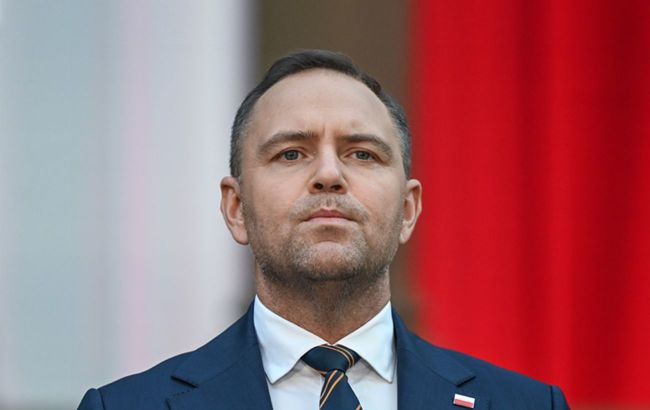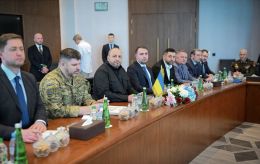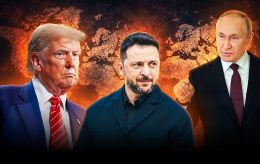Another scandal: Why Poland restricting rights of Ukrainians and banning 'Banderite symbols'
 President of Poland Karol Nawrocki (Photo: Getty Images)
President of Poland Karol Nawrocki (Photo: Getty Images)
The President of Poland, Karol Nawrocki, has put forward a series of anti-Ukrainian initiatives, both concerning Ukrainian refugees and Ukrainian history.
RBC-Ukraine explains what is behind this escalation and what the consequences might be.
Key questions
-
Why has the president of Poland intensified his rhetoric against Ukrainians?
-
How does the political divide in the country influence his statements?
-
What could be the consequences of Nawrocki’s remarks?
On August 25, the President of Poland, Karol Nawrocki, vetoed a law on social assistance for unemployed Ukrainians. Instead, he submitted his own draft bill to the Sejm, which would allow access to services and medical care only for those Ukrainians who are officially employed and pay taxes in Poland.
At the same time, statistics show that Ukrainians in Poland are by no means a burden — quite the opposite. As Ukraine’s Ambassador to Poland, Vasyl Bodnar told RBC-Ukraine, 69% of Ukrainian citizens in the country are employed. In absolute numbers, that’s about 700,000 working people.
"Ukrainians contribute around 2.7% of Poland’s GDP annually — according to the latest data, that’s about 22 billion euros a year. And that’s just from taxes," Bodnar noted.
The bill vetoed by Nawrocki is not only about social payments but has a broader context.
In connection with the veto, Poland’s Minister of Digital Affairs, Krzysztof Gawkowski, even raised the possibility of disconnecting Starlink for Ukraine — funding for this system had been tied to a fund created under the vetoed law. However, the head of the Polish President’s Chancellery promptly dismissed such a risk — but only on the condition that the Sejm (where Nawrocki does not have a majority) adopts his alternative bill.
Another of Nawrocki’s initiatives concerns draft legislation that would equate the "Banderite symbol" (Banderite - a name for the members of the OUN-B, a faction of the Organization of Ukrainian Nationalists - ed.) in Poland’s Criminal Code with Nazi and communist symbols. What exactly will be classified as a "Banderite symbol" remains unclear for now, which has already sparked widespread speculation.
Nawrocki’s motivation
Karol Nawrocki was sworn in as president only on August 6 and is a relative newcomer to Polish politics. However, his views on Ukraine have long been known. Back when he headed the Polish Institute of National Remembrance, he was noted for openly anti-Ukrainian rhetoric, especially regarding the Volhynia tragedy.
Nawrocki has stated that Ukraine would not be able to join the EU or NATO until historical disputes related to the Polish-Ukrainian conflict of the 1940s are resolved. He also criticized Ukrainian President Volodymyr Zelenskyy, accusing him of "mistreating Poland," particularly on issues related to Volhynia and grain imports.
"Even though Nawrocki formally ran as an independent candidate in this year’s presidential election, he was supported by the Law and Justice (PiS) party, which often promotes initiatives of this kind. Accordingly, he is now forced to build his presidential term by maneuvering within this political field," Stanislav Zhelikhovskyi, PhD in Political Science and international affairs expert, told RBC-Ukraine.
Therefore, Nawrocki’s current actions are hardly surprising. Especially since certain anti-Ukrainian sentiments do exist among the Polish population. According to a poll conducted by the Public Opinion Research Center (CBOS) in March of this year, 38% of Poles expressed hostility toward Ukrainians, while only 30% reported sympathy. Another 27% had a neutral attitude.
Tensions in Polish society were further fueled by a recent incident. On August 9, at a concert of Belarusian rapper Max Korzh in Warsaw, some attendees disrupted public order. A UPA (the Ukrainian Resistance Army - ed.) flag with a trident was displayed, as well as a blue-and-yellow flag with the Wolfsangel, one of the neo-Nazi and far-right symbols. Polish police detained 109 people, later deporting 63, 57 of whom were Ukrainians.
Ukraine’s Ambassador Vasyl Bodnar later reported that most of those involved in the conflict had come from other countries and did not reside permanently in Poland.
"Ukrainians who, like me, are guests in this country must comply with Poland’s laws. Anyone who breaks the law and traditions, and who lacks understanding and social sensitivity, must be held accountable," the ambassador said.
At the same time, the actions of Poland’s president are also influenced by political considerations. Currently, the government is controlled by Nawrocki’s political rivals — the Civic Coalition led by Prime Minister Donald Tusk.
The next parliamentary elections in Poland are scheduled for 2027. However, Zhelikhovskyi does not rule out the possibility of early elections, given the tension between Nawrocki and Tusk. This means the Polish president needs to maintain the attention of his electorate.
"We should understand that the elections are not that far away, even if we’re talking about the regular ones. And if snap elections are called, then both Nawrocki and PiS will obviously want to be prepared," Zhelikhovskyi noted.
Consequences of Poland’s political divide
The president’s initiatives have not been met with universal support within Polish politics. A number of Sejm deputies from the Civic Coalition criticized Nawrocki’s actions, accusing him of populism and straying from European values. This means there is a strong chance that the president’s draft bills could be blocked in the Sejm. Still, surprises are possible.
"Even the coalition has often tried to 'graze' on the opponents’ electoral field, and we could hear some radical statements from them as well, especially on historical issues. For now, that’s not the case, and there is a lot of mutual understanding, particularly in the context of exhumations, but who knows what will come next," Zhelikhovskyi concluded.
Overall, the struggle between power centers in Warsaw has consequences not only for Ukrainians but also undermines Poland’s international standing.
Just last week, a scandal erupted over Poland’s absence from a trip to Washington. Volodymyr Zelenskyy, together with other European leaders, made an unexpected visit to the US to coordinate positions for negotiations on ending the Russian-Ukrainian war. To support him, several European heads of state flew to Washington — but neither the president nor the prime minister of Poland were present. Yet, considering Poland’s contribution to helping Ukraine and its logistical importance, Warsaw had every right to be included.
So far, the Polish authorities have offered no convincing explanation as to why this happened. Instead, there has been a flurry of mutual accusations from both political camps. Such trends are dangerous in themselves, as they paralyze Poland’s leadership. This, in turn, means not only temporary difficulties for Ukraine but also risks in the longer term.
Sources: materials from Onet, Reuters, Wprost, as well as comments from Stanislav Zhelikhovskyi and Vasyl Bodnar.

